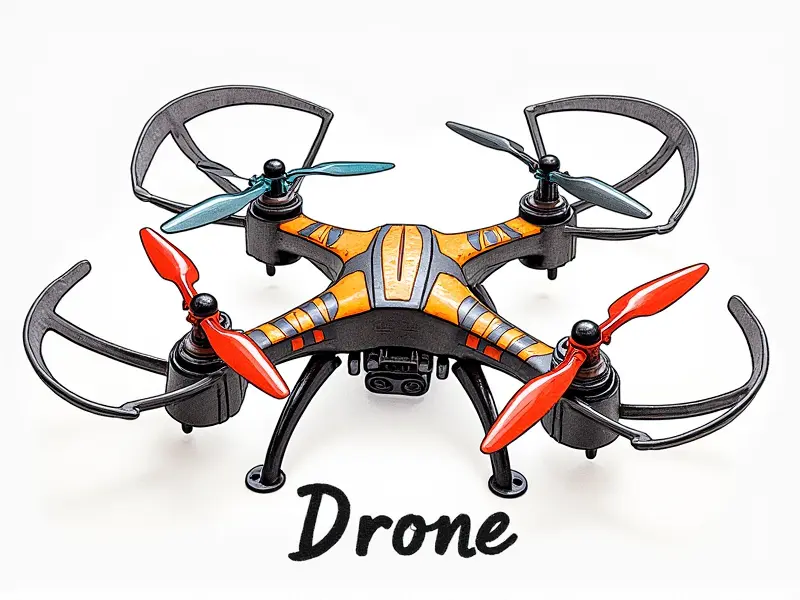What is battery capacity?

Understanding RC Drone Battery Capacity
Battery capacity in remote control (RC) drones refers to the amount of energy a battery can store and deliver before needing recharging. Measured in milliampere-hours (mAh), it directly impacts flight time, performance, and overall usability of your drone.
Why Battery Capacity Matters in RCs
Battery capacity is crucial for several reasons:
- Flight Time: Higher mAh ratings mean longer flight durations without the need to recharge.
- Power Output: A higher capacity battery can supply more power, enabling better performance and responsiveness in your RC drone.
- Stability: Adequate battery capacity ensures that your drone remains stable during high-demand maneuvers.
Maximize Flight Time with Battery Capacity
To extend flight time, consider the following tips:
- Select batteries with higher mAh ratings for longer endurance.
- Balanced battery packs ensure consistent power delivery throughout the flight.
- Optimize your drone's weight and aerodynamics to reduce energy consumption.
How to Read RC Battery Specs
Understanding battery specifications is key:
- Capacity (mAh): Indicates the amount of charge a battery can hold, directly affecting flight time.
- Voltage (V): Determines the power output and performance capabilities of your drone.
- C Rating: Measures discharge rate; higher C ratings allow for faster discharges without overheating.
Boost Your RC's Performance: Battery Tips
To enhance your RC's performance, follow these guidelines:
- Choose batteries with a high C rating to support demanding flight patterns and maneuvers.
- Select lithium polymer (LiPo) batteries for their lightweight nature and superior energy density.
- Maintain optimal battery temperature by using cooling systems or flying in moderate weather conditions.
The Impact of Battery Capacity on FPV Racing
FPV racing drones require high-performance batteries:
- Battery Weight: Lighter batteries reduce drag and improve maneuverability, crucial for competitive races.
- High C Rating: Enables rapid discharge rates necessary for quick acceleration and sharp turns in FPV racing.
- Consistent Power Delivery: Ensures stable performance throughout the race without sudden power drops.
Choosing the Right Battery for Your RC
Selecting the appropriate battery involves considering several factors:
- Type of Drone: Different drones have varying requirements based on their design and intended use.
- Battery Chemistry: LiPo batteries are popular due to their high energy density, but other types like NiMH may be suitable for specific applications.
- Capacity Needs: Assess your drone's power requirements and choose a battery that meets or slightly exceeds them.
Battery Capacity Explained: Watts vs. mAh
Understanding the relationship between watts and milliampere-hours (mAh) is essential:
- mAh: Measures how much charge a battery can hold, directly influencing flight time.
- Watts: Represents power output; calculated by multiplying voltage (V) with current (A).
Common Battery Terms Every Pilot Should Know
Familiarize yourself with these key terms:
- C Rating: Indicates the maximum discharge rate of a battery.
- SOC (State of Charge): Shows how much charge is remaining in your battery.
- Balancing: Ensures all cells within a multi-cell battery pack are equally charged or discharged.
How Much Power in Your Drone Battery?
Determining the power output of your drone's battery involves understanding its voltage and capacity:
- Voltage (V): Determines the electrical potential difference, influencing performance.
- Capacity (mAh): Indicates how much charge a battery can hold, affecting flight duration.
Quadcopter Battery Capacity 101
For quadcopters, battery capacity is critical:
- Flight Time: Longer mAh ratings translate to extended flight durations.
- Battery Weight: Lighter batteries reduce overall weight, improving maneuverability and efficiency.
- Performance: Higher capacity supports better performance during high-demand maneuvers.
Conclusion
Selecting the right battery for your RC drone is crucial to achieving optimal flight time, performance, and stability. Understanding key terms like mAh, watts, C rating, and SOC will help you make informed decisions when choosing batteries that meet your specific needs. Whether you're flying FPV races or simply enjoying recreational flights, investing in high-quality batteries can significantly enhance your RC experience.

